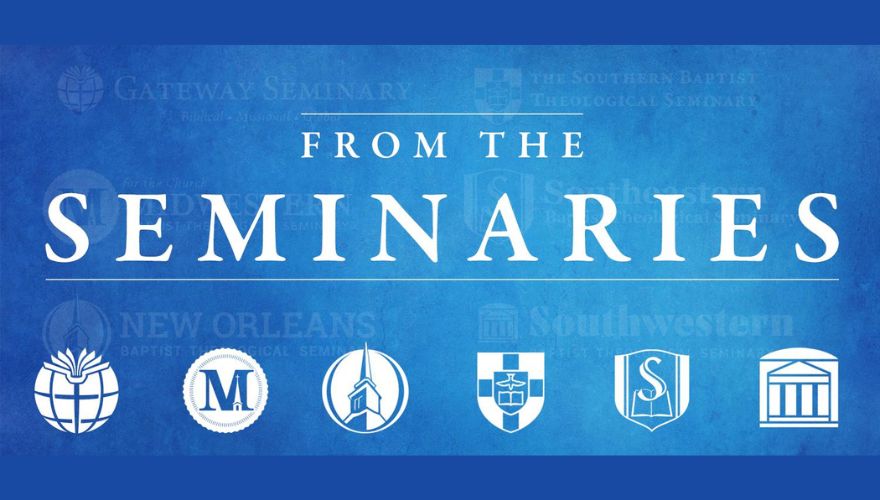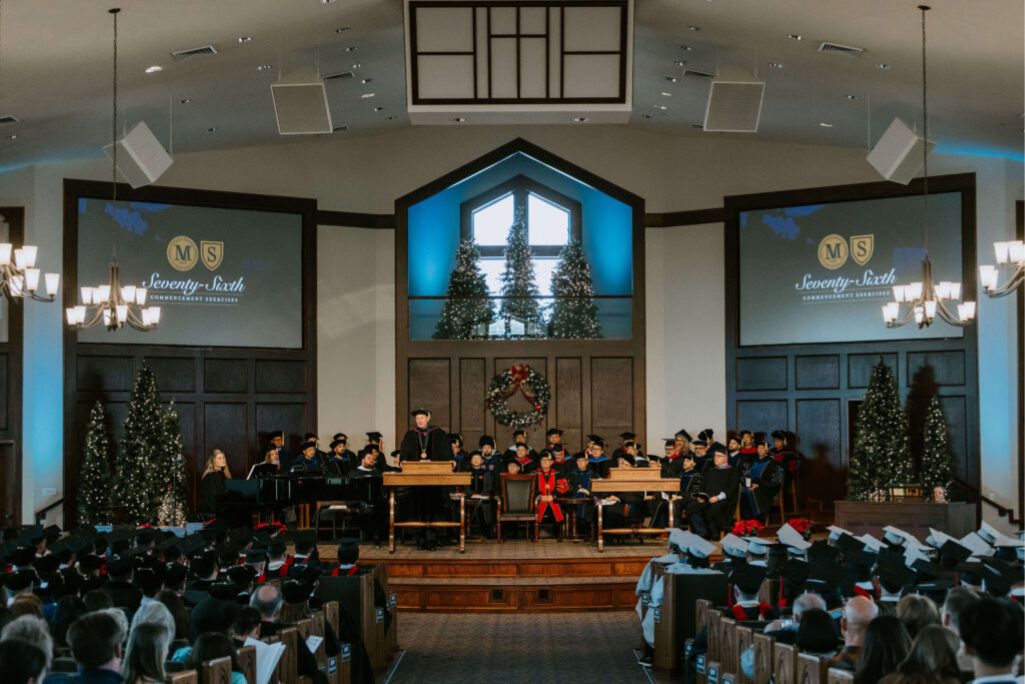
Vol. 2 of Spurgeon’s sermons released through MBTS partnership
By Michaela Classen, MBTS
KANSAS CITY, Mo. — After decades out of print, Charles Spurgeon’s sermons from the earliest years of his preaching at the Metropolitan Tabernacle have been republished for a new generation.
Released through a partnership between Reformation Heritage Books and the Spurgeon Library at Midwestern Baptist Theological Seminary (MBTS), the new set contains weekly sermons that Charles Spurgeon preached to his London congregation from 1861 to 1876.
“I am very grateful for the release of this second set of republished Spurgeon sermons,” said Jason Allen, president of MBTS. “Spurgeon’s sermons never disappoint. In them one can see meaningful exposition and Christ’s beauty on display. That is one of the reasons I am thankful for our partnership with Reformation Heritage Books to republish these sermons. I am thankful that pastors and Christians everywhere can have easy access to the Prince of Preachers. I know they will be edified and built up in their walk with Christ as a result.”
Geoff Chang, curator of the Spurgeon Library and assistant professor of Church history and historical theology at Midwestern Seminary, said, “We are thrilled to be partnering with Reformation Heritage Books to make these sermons available for a new generation of Christians, to foster their spiritual growth, and for pastors and church leaders, to equip them to proclaim the truth with power.”
In 2024, the Spurgeon Library and Reformation Heritage Books established a partnership to republish Charles Spurgeon’s 63 volumes of sermons. The new set, containing Volumes 7-22, is the second of five sets to be released, following Volumes 1-6 in August 2024. All the sermons in the new collection are scanned from original published editions provided by the Spurgeon Library.
Sermons in the new set reflect not only Spurgeon’s Christ-centered preaching but also the events of his ministry in this period. By 1861, Spurgeon’s congregation at the New Park Street Chapel had outgrown its meeting space, leading to the construction of the Metropolitan Tabernacle. Seating 6,000 people, the new building testified to God’s power at work in Spurgeon’s preaching to save hearers and build His church by the message of the cross.
Chang reflects on this revival context in his introduction to the new set, writing, “Through a 19-year-old country preacher, a dying congregation was revitalized, and hundreds – perhaps thousands – were converted under his ministry during those early years.”
Chang’s introduction goes on to note the fruit of this revival seen in two ministries undertaken by the Metropolitan Tabernacle during this period: the Pastors’ College in 1861 and Stockwell Orphanage in 1867. Another key event during these years was the Baptismal Regeneration Controversy in England, in which Spurgeon opposed proponents’ view that baptism was sufficient to save.
MBTS panel considers churches’ use of technology
By Michaela Classen/MBTS
KANSAS CITY, Mo. — Midwestern Baptist Theological Seminary (MBTS) welcomed Justin Taylor and Denny Burk to chapel on April 1 for a panel discussion on technology and ecclesiology. The conversation considered biblical wisdom for the use of artificial intelligence (AI) in ministry, the consumption of recorded sermons and the rise of online church venues.
Taylor, who serves as executive vice president for book publishing at Crossway, and Burk, who serves as professor of biblical studies at Boyce College, were joined by Midwestern Seminary President Jason Allen and professors Jason Duesing, Patrick Schreiner, Geoff Chang and Jared Wilson.
Introducing the panelists, Allen said, “These are very gifted, capable and accomplished brothers, all faithful ministers of the gospel in local churches in addition to having instructional, writing and publishing ministries.”
Allen opened the conversation with a discussion on the use of AI for sermon preparation. Panelists noted several problems with this practice, including the risk of plagiarism. Reflecting on the formative and shepherding aspects of working through a biblical text to prepare a sermon, panelists also cautioned that AI’s priorities of efficiency and productivity can work against these God-ordained processes.
Schreiner, who serves as associate professor of New Testament and biblical theology, noted, “The formation of a person is a process, which sometimes means slowing down and falling in love with meditative and contemplative work, where you are letting the Word of God seep into your soul and you are thinking about your congregation or those you’re speaking to, considering, ‘How does this apply to them?’”
He added, “AI can’t shepherd your congregation. The call is to shepherd a congregation.”
The conversation then turned to consider the wisdom of listening to recorded sermons and other spiritual content online. Panelists affirmed the value of biblical content while addressing the importance of active attention to God’s Word and the priority of hearing it alongside His gathered people.
“If you are listening to a recorded sermon, you get good content, and that’s good. There’s nothing wrong with that. But is that sufficient?” Taylor asked. He reflected on the possibility of sharing constructive feedback with a pastor after a sermon, which is uniquely done in the context of listening to preaching in person. “There is something about being in the presence of the pastor, knowing him, having him look at you, and knowing the context in which he’s preaching the Word,” Taylor said.
Wilson, who serves as assistant professor of pastoral ministry, pointed to the importance of showing honor for God’s Word, saying, “If our normative use of sermon reception is scrolling through our phones, it doesn’t have the same reverence for God’s Word as the regular gathering of God’s people to hear the preached Word from an ‘incarnate’ presence who is bringing that Word.”
The conversation then narrowed to focus on the practice of replacing gathered church fellowship with online content or video venues. Panelists reflected on the biblical word “church,” meaning “assembly,” and noted the spiritual benefit of embodied fellowship.
Sean McDowell says ‘God is back’ at SBTS lecture
By Jacob Percy, SBTS
LOUISVILLE, Ky. — Southern Baptist Theological Seminary (SBTS) welcomed Sean McDowell to campus for the annual Gheens Lecture series and to speak at the Student Ministry Workshop on March 25. McDowell serves as associate professor of Christian apologetics at Talbot School of Theology, Biola University and co-host of the Think Biblically podcast. In his lecture series, “Why God Is Back in 2025,” McDowell addressed the Southern Seminary community about the shifting public conversation on faith.
“Something unexpected is happening in 2025,” McDowell said. “Belief in God and the supernatural appear to be making a comeback. From the 1966 ‘Is God Dead?’ cover of Time Magazine and the new atheist movement of the 2000s, the God conversation has shifted. Unexpected people are leading religious conversations, like Jordan Peterson and Joe Rogan. We’ve also seen high-profile conversions like the former ‘new atheist’ Ayaan Hirsi Ali. Finally, there’s a growing awareness of the failure of secularism.”
In addition to the Gheens Lectures, McDowell spoke at the Student Ministry Workshop, which equips student leaders with the tools needed to address contemporary challenges in their ministry contexts. The interactive sessions encouraged students to think critically and engage confidently in gospel conversations.
Paul Akin, SBTS provost, expressed gratitude for McDowell’s time on campus.
“We were honored to have Sean McDowell on campus to deliver the Gheens Lectures to our campus community and our special guests attending the student leaders workshop,” Akin said. “McDowell’s expertise on current apologetics issues helped equip our students and the cohort of student leaders to defend the faith with clarity and precision. Our aim at Southern Seminary and Boyce College is to help our students and church leaders engage biblically and thoughtfully with cultural challenges while strengthening their confidence in the truth of the gospel.”
The Gheens Lectures are a long-standing tradition at Southern Seminary, bringing influential scholars and ministry leaders to campus to address vital theological and cultural topics. McDowell’s visit continued this legacy by reinforcing the seminary’s commitment to training students to stand firm in their faith while effectively engaging the world around them.
For more information about upcoming lectures and events at Southern Seminary, visit www.sbts.edu.

